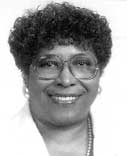Rhetaugh Dumas
Rhetaugh Dumas, who served as dean of the School of Nursing 1981-94 and was an esteemed international leader in nursing and health care, died July 22 at age 78. Her exemplary career had a major impact in the advancement of nursing, health care and academic programs at the University, colleagues say.

Under Dumas’ stewardship, the School of Nursing has advanced to a position of prominence among the top four nursing schools in the country. She led dramatic progress in forging cooperative and collaborative connections with the School of Medicine and collaborative research and other initiatives between faculty and students of the School of Nursing and the colleagues in related disciplines, colleagues say. Her vision, insight and wise counsel led to changes that have positioned both the school and nursing services at the Medical Center for meeting the challenges of the future. She remained dean until 1994, when she was named vice provost for Health Affairs and the Lucille Cole Professor of Nursing. She retired from active faculty status in December 2001, after 20 years of service.
As dean of the School of Nursing, Dumas was an ardent advocate of excellence in nursing research and scholarship as a means of advancing the discipline. She provided a powerful vision of nursing and demonstrated considerable personal and professional influence in many spheres. A renowned national and international scholar in the area of psychiatric nursing, Dumas conducted extensive externally funded research on clinical experiences in nursing practice and authored many journal articles and book chapters. She served on many national boards and committees, and for several years served on the President’s National Bioethics Advisory Commission.
Dumas obtained a bachelor’s degree in nursing from Dillard University in 1951 and a master’s degree in psychiatric nursing from Yale University in 1961. In 1975 she received a doctorate degree in social psychology from Union Graduate School #1 (Antioch College Campus), Union for Experimenting Colleges and Universities.
She began her appointment as dean of the School of Nursing and professor of nursing in 1981 and was reappointed in 1986 and 1991 to second and third terms. Before arriving at Michigan, Dumas was with the National Institute of Mental Health, where she served as deputy director of the Alcohol, Drug Abuse, and Mental Health Administration (1979-81), and chief of the Psychiatric Nursing Education Branch of the Division of Manpower and Training Programs (1972-76).
Prior to these national administrative positions, Dumas was a faculty member of Yale University’s School of Nursing from 1962-72 and served as associate professor and chair of its Psychiatric Nursing Program (1966-72) and director of nursing of the Connecticut Mental Health Center at the Yale-New Haven Medical Center.
Dumas held many other administrative and teaching positions during her career. She participated in the C.G. Jung Institute of Chicago and Zurich, Switzerland, exploring the current conceptions of the nature of leadership and completed her membership on the National Commission of the Future Structure of the Veteran’s Administration during an administrative leave in 1991-92.
Dumas received honorary doctoral degrees from Yale University, Simmons College, the University of Cincinnati, Dillard University and the University of San Diego. In addition, she received the Mentor Award from Sigma Theta Tau, International Honor Society of Nursing. Since 1973 she was a member of the Institute of Medicine, National Academy of Sciences.
She was the first woman, and the first nurse, to serve as deputy director of the National Institute of Mental Health, and was the first black woman to serve as dean at the University. She was one of 36 distinguished nurses who were Charter Fellows of the American Academy of Nursing when it was established in 1973, and served as the academy’s president from 1987-89.
John Kadlec
Former U-M wildlife ecologist and wetland scientist John Kadlec, who spent decades studying waterfowl and waterfowl management, died July 14 in Logan, Utah. He was 75.

Kadlec was born in Racine, Wis., on Sept. 22, 1931. After graduating from high school there, he enrolled at the University and earned a bachelor’s degree in 1952 from the School of Natural Resources, now the School of Natural Resources and Environment (SNRE), majoring in forestry.
He received a master’s degree from the U-M in 1956 and a doctorate in wildlife science in 1960. He then worked for the Michigan Department of Natural Resources as a field ecologist and later took a position with the U.S. Department of the Interior in Massachusetts.
In 1968, Kadlec returned to Ann Arbor and joined the SNRE faculty. Early on, he worked on the International Biological Program, a National Science Foundation-funded effort to study and model the structure and function of ecosystems.
“It was naïve, but the hope at the time was that everything about ecosystems could be studied by following energy transfers and storage,” says Berkeley wildlife ecologist Dale McCullough, who was a U-M colleague of Kadlec’s at the time.
“A whole lot of very good science was done, and this program was a major contribution to mathematical modeling in ecology,” McCullough says. “But the complexity of nature undermined the grand hopes.”
In 1974, Kadlec left his associate professor position at the University to head the fisheries and wildlife program at Utah State University in Logan. He went on to serve as dean of the school’s College of Natural Resources and retired in 1999.
In Utah, Kadlec’s research focused on the Great Salt Lake ecosystem. He studied the impacts of both drought and flooding on game and non-game birds, lake salinity, plant growth and invertebrate populations. His final research project examined the impact of botulism on the Great Salt Lake ecosystem.
“John Kadlec was a renowned wildlife biologist and wetland scientist with major interests in waterfowl and waterfowl management,” says U-M ecologist Douglas Wilcox. “Most of his credentials were built at Utah State, where he also trained many new wetland scientists.”
Kadlec’s younger brother, Robert, earned a master’s and a doctorate from the University and was a faculty member at the College of Engineering. The brothers collaborated on a research project at Houghton Lake, says Susan Kadlec, one of John Kadlec’s daughters.
John Kadlec’s favorite pastime was duck hunting. He carved his own decoys and spent hours on the marshes in his duck boat with his dog.
He is survived by his wife, Bernice, and four children: Susan Kadlec of Logan; Mark Kadlec of Fort Collins, Colo.; David Kadlec of Logan; and Beth Kadlec of Logan. He also is survived by brother Robert Kadlec of Chelsea, Mich.; sister Ruby Hauch of Brookfield, Wis.; and a granddaughter.
A scholarship fund is being established in Kadlec’s memory. To contribute, make checks payable to Utah State University, with “John Kadlec Memorial Scholarship” in the memo line. The mailing address is: Utah State University, College of Natural Resources, 5200 Old Main Hill, Logan, UT 84321.
—Submitted by Jim Erickson, News Service
Lillian Ostrand
Lillian Ostrand, professor emeritus of public health nursing and director of the public health nursing program from 1973 until her retirement in 1978, died July 5 in Dayton, Ohio. She was 92.
“Professor Ostrand was a highly respected teacher, public health nursing adviser and consultant,” says Ken Warner, dean of the School of Public Health (SPH). “She had an ongoing concern for patients as people, and she passed that along to her students.”
A native of Crystal Falls in the Upper Peninsula, Ostrand devoted more than four decades to her public health nursing career. She received her training at Augustana Hospital School of Nursing in Chicago in 1937, and developed an early interest in public health nursing while working with Chicago’s visiting nurse association. During World War II, she served with the Army Nursing Corps in the U.S. and in England, earning the rank of captain before leaving the service in 1945.
Following World War II, she began her career as a public health nurse with the Washtenaw County Health Department while she completed her Bachelor of Science degree in public health nursing from SPH. Ostrand returned to the school in 1955 and completed her master of public health degree in 1957. She was named associate professor of public health nursing in 1969, program director in 1973 and professor of public health in 1974. She retired from SPH in 1978.
In addition to her service with the University, Ostrand was a consultant to the Michigan and Ohio departments of health, the Detroit Visiting Nurse Association, and Health Education and Welfare Bureau of Health Manpower. In 1977 the Michigan Public Health Association presented her with its distinguished service award and in 1978 she received the American Nursing Association Pearl McIver Award “for significant contributions to the field of public health on a national level, and for expertise in professional and technical performance and leadership in public health.”
In retirement, Ostrand was on the board of Silver Maples Retirement Center in Chelsea, a member of King of Kings Lutheran Church, a docent at the U-M Museum of Art and a member of the Women’s Faculty Club. Pastor Michael Ryan of King of Kings says when he needed help from anyone, he often called on Ostrand to make the ask, “because no one could say ‘no’ to Lillian.”
A memorial service will be held 11 a.m. Aug. 18, at King of Kings Lutheran Church, 2685 Packard Road, Ann Arbor.
—Submitted by Terri Mellow, School of Public Health

